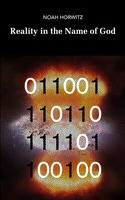Reality in the Name of God, or, Divine Insistence: An Essay on Creation, Infinity, and the Ontological Implications of Kabbalah
Author(s)
Horwitz, Noah
Collection
ScholarLedLanguage
EnglishAbstract
What should philosophical theology look like after the critique of Onto-theology, after Phenomenology, and in the age of Speculative Realism? What does Kabbalah have to say to Philosophy? Since Kant and especially since Husserl, philosophy has only permitted itself to speak about how one relates to God in terms of the intentionality of consciousness and not of how God is in himself. This meant that one could only ever speak to God as an addressed and yearned-for holy Thou, but not to God as infinite creator of all. In this book-length essay, the author argues that reality itself is made up of the Holy Name of God. Drawing upon the set-theoretical ontology of Alain Badiou, the computational theory of Stephen Wolfram, the physics of Frank Tipler, the psychoanalytical theory of Jacques Lacan, and the genius of Georg Cantor, the author works to demonstrate that the universe is a computer processing the divine Name and that all existence is made of information (the bit). As a result of this ontic pan-computationalism, it is shown that the future resurrection of the dead can take place and how it may in fact occur. Along the way, the book also offers compelling critiques of several significant theories of reality, including the phenomenological theologies of Emmanuel Levinas and Jean-Luc Marion, Process Theology, and Object-Oriented Ontology.
Keywords
kabbalah; speculative realism; theology; set theory; ontology; Jewish mysticismDOI
10.21983/P3.0003.1.00ISBN
9781468096361OCN
1100491423Publisher
punctum booksPublisher website
https://punctumbooks.com/Publication date and place
2012Classification
Judaism
Mysticism


 Download
Download